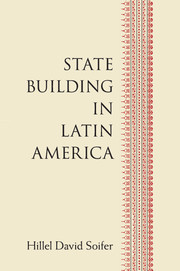Crossref Citations
This Book has been
cited by the following publications. This list is generated based on data provided by Crossref.
Pribble, Jennifer
2015.
The Politics of Building Municipal Institutional Effectiveness in Chile.
Latin American Politics and Society,
Vol. 57,
Issue. 3,
p.
100.
Foa, Roberto Stefan
and
Nemirovskaya, Anna
2016.
How State Capacity Varies within Frontier States: A Multicountry Subnational Analysis.
Governance,
Vol. 29,
Issue. 3,
p.
411.
Soifer, Hillel David
2016.
Regionalism, Ethnic Diversity, and Variation in Public Good Provision by National States.
Comparative Political Studies,
Vol. 49,
Issue. 10,
p.
1341.
Koss, Daniel
and
Sato, Hiroshi
2016.
A Micro-Geography of State Extractive Power: the Case of Rural China.
Studies in Comparative International Development,
Vol. 51,
Issue. 4,
p.
389.
Singh, Prerna
and
vom Hau, Matthias
2016.
Ethnicity in Time.
Comparative Political Studies,
Vol. 49,
Issue. 10,
p.
1303.
Dincecco, Mark
and
Wang, Yuhua
2017.
Violent Conflict and Political Development Over the Long Run: China versus Europe.
SSRN Electronic Journal ,
Luna, Juan Pablo
and
Soifer, Hillel David
2017.
Capturing Sub-National Variation in State Capacity: A Survey-Based Approach.
American Behavioral Scientist,
Vol. 61,
Issue. 8,
p.
887.
González, Yanilda María
2017.
“What citizens can see of the state”: Police and the construction of democratic citizenship in Latin America.
Theoretical Criminology,
Vol. 21,
Issue. 4,
p.
494.
Augusto Meléndez, María Claudia
Dargent Bocanegra, Eduardo
and
Rousseau, Stéphanie
2017.
Más allá de la capacidad estatal: sociedad civil e implementación de políticas a nivel subnacional en Cusco y San Martín (Perú).
Colombia Internacional,
p.
99.
Bird, Richard M.
2017.
Are Global Taxes Feasible?.
SSRN Electronic Journal,
Bebbington, Anthony
Hinfelaar, Marja
and
Sanborn, Cynthia
2017.
Political Settlements and the Governance of Extractive Industry: A Comparative Analysis of the Longue Durre in Africa and Latin America.
SSRN Electronic Journal,
Simpser, Alberto
Slater, Dan
and
Wittenberg, Jason
2017.
Dead But Not Gone: Contemporary Legacies of Communism, Imperialism, and Authoritarianism.
SSRN Electronic Journal,
ABBOTT, JARED A.
SOIFER, HILLEL DAVID
and
VOM HAU, MATTHIAS
2017.
Transforming the Nation? The Bolivarian Education Reform in Venezuela.
Journal of Latin American Studies,
Vol. 49,
Issue. 4,
p.
885.
Dincecco, Mark
2017.
State Capacity and Economic Development.
Saylor, Ryan
2018.
Rethinking Taxation in Latin America.
p.
31.
Muñoz, Paula
2018.
Buying Audiences.
vom Hau, Matthias
2018.
State and Nation Making in Latin America and Spain.
p.
317.
Merke, Federico
Reynoso, Diego
and
Schenoni, Luis
2018.
Foreign Policy Change in Latin America: Exploring a Middle Range Concept.
SSRN Electronic Journal,
Yashar, Deborah J.
2018.
Homicidal Ecologies.
Orihuela, José Carlos
2018.
State and Nation Making in Latin America and Spain.
p.
107.





